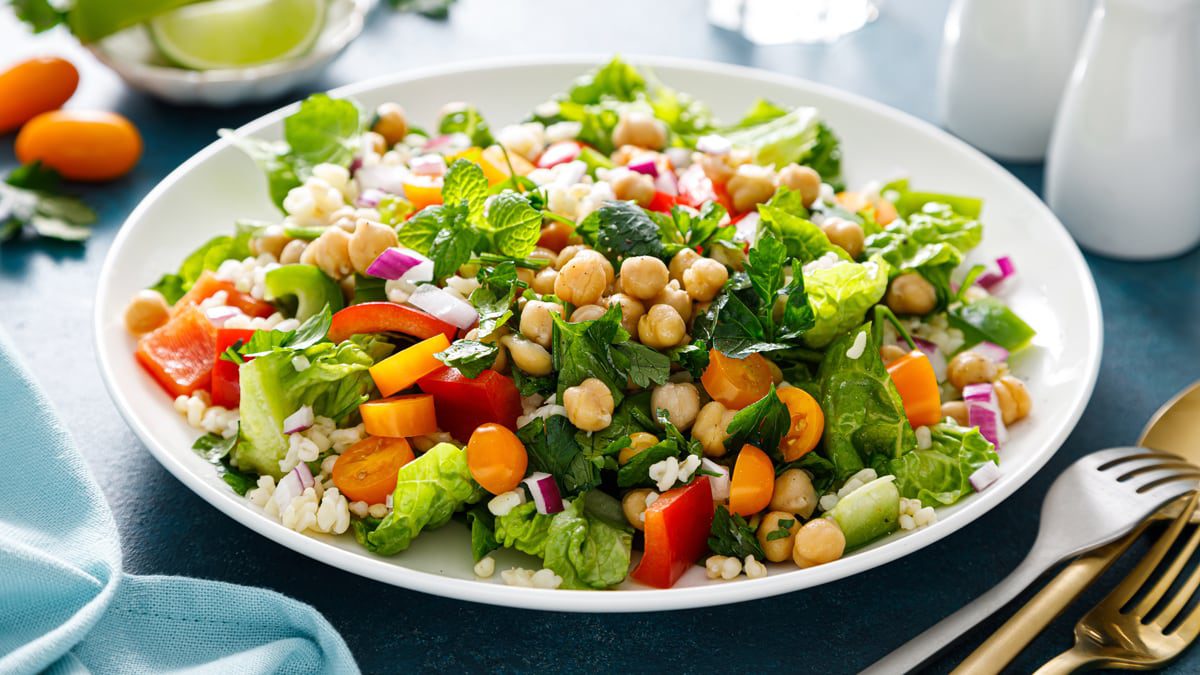Ask Dr Adam: Can You Lower Your Cortisol Levels Through Your Diet Alone?

If recent headline-grabbing stats are anything to go by, we’re living in the midst of a global stress crisis. As many as 74% of adults say they feel overwhelmed by stress, with about one in ten experiencing a low-level sense of frazzle on the daily.
Whether it’s an overflowing inbox, the relentless cycle of negative global events or the cost of living crisis, few of us are strangers to the effects of having too much on our plates, and it’s often easier said than done to tap out of the careers and responsibilities that are pushing us closer to burnout.
As such, many of us are now looking for small but effective ways to regulate our nervous systems and curtail our cortisol levels, in an effort to better manage our fractious, modern lives. Sure, you might not be able to quit your corporate 9-5 and jet off to a remote Greek island, but you can swap those cortisol-ramping HIIT workouts for gentler LISS sessions that don’t spike your adrenaline.
So when it comes to diet, are there certain foods we can prioritise to reduce the symptoms of stress – and how big of a difference do our nutrition choices actually make? We asked Form’s resident nutrition expert, Dr Adam, to chew over the facts.
First up, what exactly is cortisol and how is it linked to stress?
Cortisol is a glucocorticoid hormone released through your hypothalamic–pituitary–adrenal (HPA) axis, which is basically a direct line from your brain to your adrenal glands. It’s symbolic of stress because when your stress response fires up, that HPA axis triggers the release of cortisol.
It’s often labelled the ‘stress hormone’, but it’s not inherently bad. In fact, cortisol is essential for helping your body mobilise fuel – it plays a big role in glucose regulation, fat metabolism and your overall energy response. It only becomes problematic when levels stay chronically high or are released at the wrong times of day.
So timing matters when it comes to the release of cortisol?
Yes, timing and context are key. Cortisol naturally follows a circadian rhythm in our bodies – it peaks in the morning to help you wake up and gradually declines throughout the day. If you’re constantly stressed, eating erratically, or not sleeping well, that rhythm gets disrupted.
Cortisol becomes an issue when it’s persistently high (as it’s a sign your stress response is firing regularly) or when it’s released at times when your body’s already flooded with glucose or insulin – that’s when you can start seeing issues like extra fat storage on the body, leading to weight gain, or glucose dysregulation, which can cause a wide range of health issues by damaging blood vessels and organs over time.

Can you actually lower cortisol through diet alone?
Diet definitely plays a part, but it’s only one piece of the puzzle. Because cortisol levels fluctuate so much throughout the day, it’s really hard to pinpoint exactly how much diet alone can change them.
That said, there’s evidence that people who follow healthier eating patterns tend to have lower cortisol overall; the Mediterranean diet is just one well studied example of this. The reason it may be effective at managing cortisol is probably down to the combination of factors: it’s higher fibre, full of healthy fats such as omega-3s, contains antioxidants from all the fruit and vegetables and has a general reduction in ultra-processed foods and saturated fat.
Generally, the whole foods you find in the Mediterranean diet are known to support metabolic health and reduce inflammation, both of which can help regulate cortisol indirectly.
Are there specific foods that are good for regulating cortisol?
Not really in isolation. You’ll often see lists online claiming that certain foods ‘lower cortisol’, but the evidence for these specific ingredients is fairly weak. Omega-3 fatty acids, fibre-rich foods that support the gut, and plenty of colourful fruit and vegetables are all beneficial – but it’s the overall dietary pattern that really matters.
We eat meals, not individual nutrients, so it’s the collective effect of your whole diet that counts.
And what about meal timing – does intermittent fasting help?
Essentially, there’s no one-size-fits-all rule when it comes to meal timing. There’s evidence to suggest that reducing your eating window can be helpful because it allows your body more time in a fasted state. For instance, eating over 10 hours instead of 12 or more.
Early time-restricted eating (where you finish your last meal earlier in the evening) seems slightly more effective than eating late too, but consistency is the thing that’s more important here. Constant snacking or eating late at night means you’re keeping your glucose and insulin levels up when cortisol is still active, which can make fat storage more likely, especially around the abdomen.
So, making sure your eating habits are aligned with your body’s natural rhythms can make a potentially meaningful difference to your cortisol levels.
What’s the takeaway for anyone looking to manage stress through diet?
Generally, I’d say to focus on the basics of eating mostly whole, unprocessed foods, getting enough fibre and protein, including healthy fats and trying to keep a regular eating pattern. If you’re looking for some rough guidelines, the Mediterranean diet is still the best-evidenced approach overall.
It’s also important to caveat that your diet alone won’t fix chronic stress, especially if the rest of your lifestyle is working against you – so take a look at your routine and see where you can remove or reduce overall stressors.


















